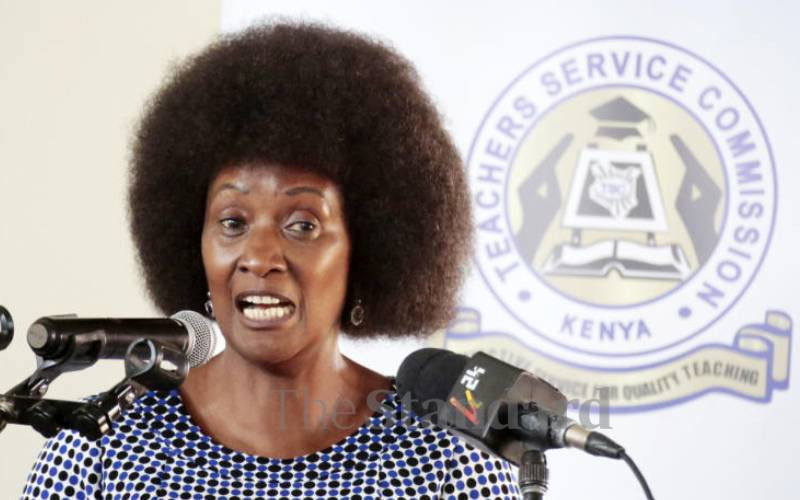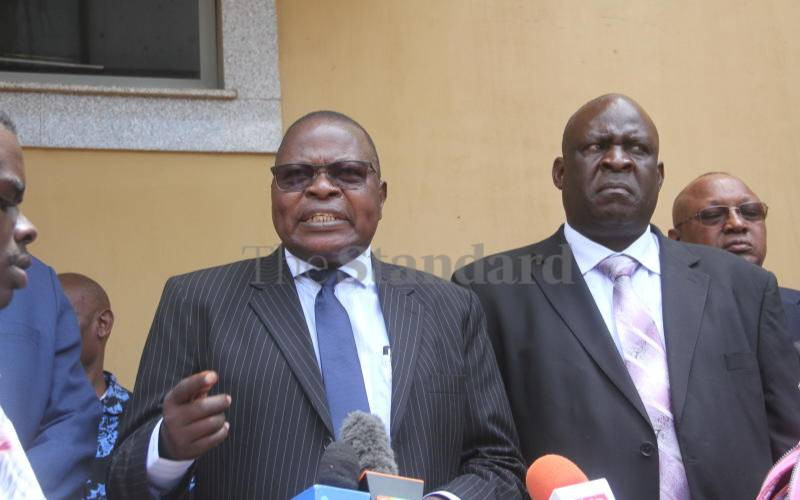“It is not news. They should have obeyed court orders and gone back last week,” said Teachers Service Commission (TSC) chairperson Lydia Nzomo in response to questions from journalists who sought to know if teachers, having suspended their strike, would be paid their September salaries. She said she would give a concrete answer after consulting her colleagues.
Mrs Nzomo’s attitude plays into the hands of those who have been criticising TSC and by extension the Government for showing disdain for the rule of law, preferring that the other side of the dispute should obey the courts while they remain aloof, not bound by the same courts’ verdict.
We are not at liberty to discuss the merits or demerits because some aspects of the standoff between teachers, represented by the Kenya National Union of Teachers and the Kenya Union of Post Primary Education teachers and their employer (TSC)are before court, but suffice it to say the TSC has defied court orders. Only about 40,000 of the nearly 280,000 teachers are said to have received their September salary.
The same court order that asked teachers to go back to work admonished TSC against victimising teachers who have been on the protracted strike and failing to pay them their September salaries in full. TSC had indicated it would not pay salaries for days not worked.
As a sign of good faith, TSC must go along with the court’s direction as teachers have done; and show respect for the rule of law by paying the teachers’ salaries even as the matter of the salary award of between 50 and 60 per cent is deliberated upon.
As in the past, teachers have lost the latest battle against an intransigent government, but the war is still on. The teachers’ unions, Knut and Kuppet, have made it clear that the strike has not been called off and that they merely obeyed a court order to allow for more consultations. This position also has connotations of intransigence that must be discarded if the matter is to be resolved. Again, court orders must be obeyed in full, not grudgingly or with conditions, as the unions seem to be doing. Both sides must come to the table and sort out the matter once and for all.
The public is tired of this grandstanding. It is the hope of all that within the 90 days allowed for negotiations, the two parties will come to an agreement and end suffering among parents and the learners, who should not be held to ransom year in, year out over a matter that can be sorted out amicably.
Teachers had initially demanded a pay rise of between 250 and 300 per cent, but the TSC committed itself to pay 50 to 60 per cent. Developments in the Government make it hard to see the point that it is under financial constraints. Not when it is willing to employ 70,000 teachers at short notice at Sh20,000 a month.
If the Government can afford to set aside Sh20 billion to fight projected damage from a yet-to-come El Nino, spends Sh600 million in three days to induct parastatal chiefs and sets aside Sh 45billion to bail out a dying sugar industry; it is hard to convince the public that it is too cash-strapped to do anything about the teachers’ pay row.
There is need for sincerity on both sides if this matter is to be concluded amicably. The disparities in the figures the Government and the teachers unions tendered as basic pay for teachers, and which saw the opposition come in with their own set of figures regarding the wage bill shows the teachers’ pay dispute has been politicised, yet this should not be the case.
Educational standards are at risk of plummeting below acceptable standards unless serious attention is given to matters of education in general.
 The Standard Group Plc is a
multi-media organization with investments in media platforms spanning newspaper
print operations, television, radio broadcasting, digital and online services. The
Standard Group is recognized as a leading multi-media house in Kenya with a key
influence in matters of national and international interest.
The Standard Group Plc is a
multi-media organization with investments in media platforms spanning newspaper
print operations, television, radio broadcasting, digital and online services. The
Standard Group is recognized as a leading multi-media house in Kenya with a key
influence in matters of national and international interest.
 The Standard Group Plc is a
multi-media organization with investments in media platforms spanning newspaper
print operations, television, radio broadcasting, digital and online services. The
Standard Group is recognized as a leading multi-media house in Kenya with a key
influence in matters of national and international interest.
The Standard Group Plc is a
multi-media organization with investments in media platforms spanning newspaper
print operations, television, radio broadcasting, digital and online services. The
Standard Group is recognized as a leading multi-media house in Kenya with a key
influence in matters of national and international interest.








